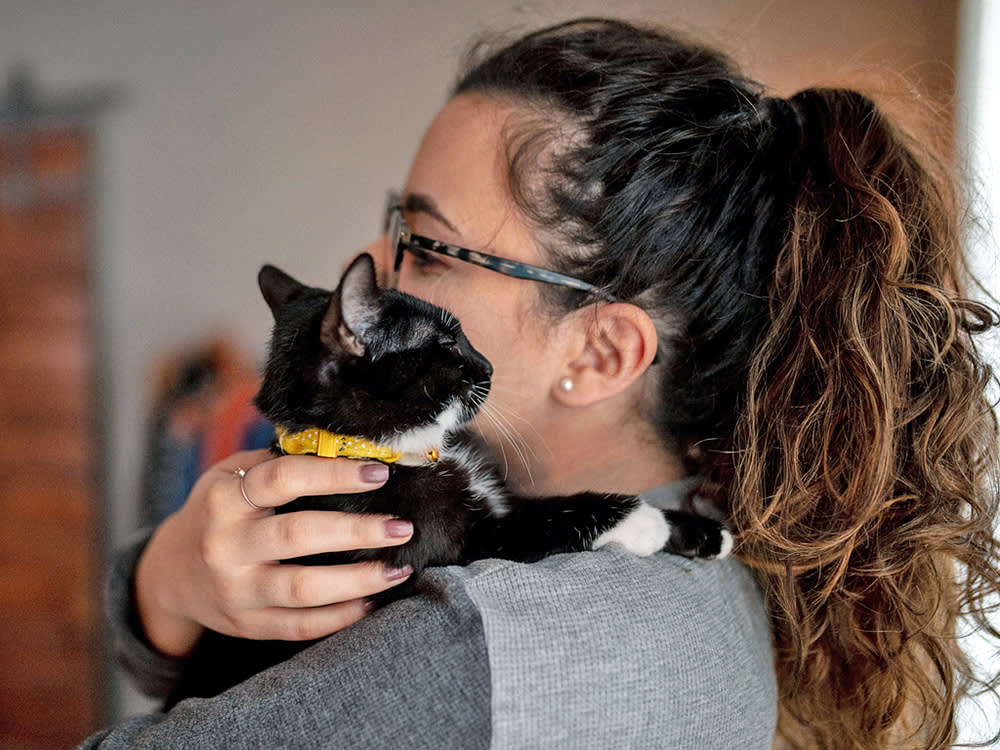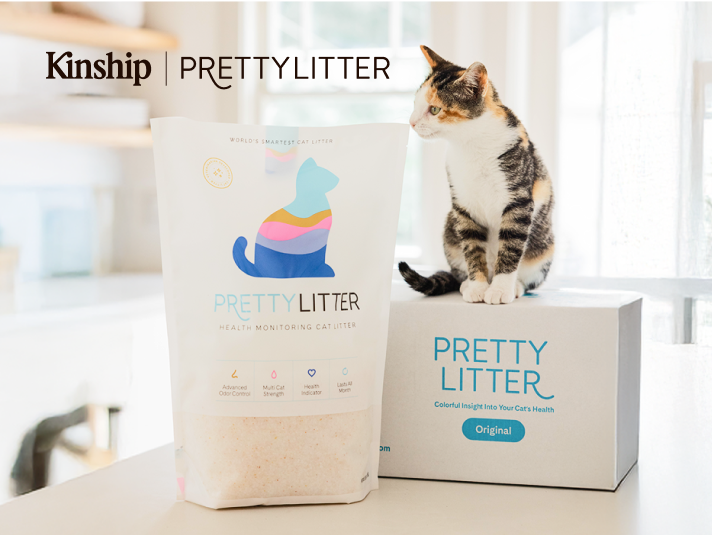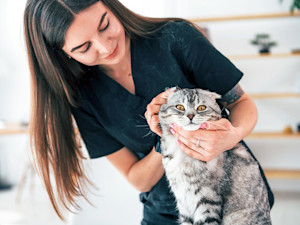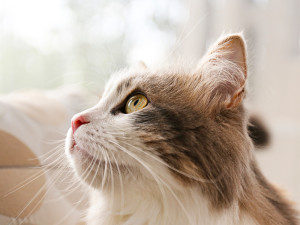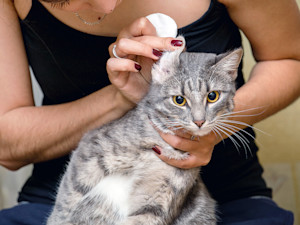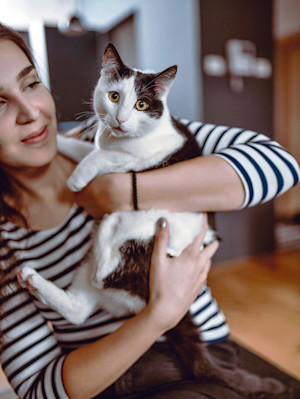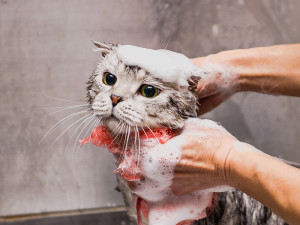Why Do Cats Like Earwax?
It’s so weird.
In This Article:
Where Does Earwax Come From and What Is it? How Is Your Cat Ingesting Earwax? Why Do Cats Like Earwax? Is Earwax OK for Cats? How to Prevent Your Cat from Eating Earwax When to Consult a Vet About This Issue Frequently Asked Questions
When you think about a cat who loves earwax, you’re probably envisioning something pretty disgusting right now. It’s not as bad as it sounds. We’re not talking about an earwax lollipop. Think more along the lines of one cat grooming another cat’s ears, or your cat digging through the garbage and pulling out a cotton swab.
Is there something about earwax that drives your cat to seek it out? Let’s explore cats, ears, and that waxy treat.
Save on the litter with color-changing tech that helps you better care for your cat.
How much do you spend on your pet per year?
Where does earwax come from, and what is it?
Bodies produce a lot of goo. Ears are one of the gooey parts. Within the ear canal are glands that produce earwax. It’s made mostly of sebum, a substance that includes other goo, like cholesterol, keratin, long-chain fatty acids, and dead skin cells.
Earwax does important things, like keeping the ear moist, protecting against infection, and trapping and removing dirt and gunk.
How is your cat ingesting earwax?
Cats can eat earwax in a variety of ways. The most common is probably through grooming themselves, other cats, and even other animals, like the family dog.Some cats will also suckle the body parts of other pets, like the ears. It can happen with human ears as well.
Cats are also known for grabbing cotton swabs out of the garbage. They may chew or lick them, getting some earwax in the process. This isn’t a good idea, though. A cotton swab can bend or break into smaller pieces, making it easier to ingest or get stuck in your cat’s mouth or throat.
Why do cats like earwax?
Do cats actually enjoy earwax, or are they just getting a little in the process of doing other things? While we can’t ask them directly, we can make some assumptions based on what we know.
They enjoy the taste.
Consider the components of earwax, like fatty acids, the building blocks of fat. Cats need fatty acids in their diet. It’s reasonable to think they could be drawn to those fatty acids in various forms, including earwax.
It’s possible that the various components of earwax have a taste that cats enjoy. They’re obligate carnivores. They happily eat a variety of fluids and other “stuff” when hunting live prey. Let’s face it, earwax may be the least disgusting.
They enjoy the scent.
Again, think about what makes up earwax and keep in mind that a cat’s sense of smell is far better than ours.
Fatty acids and other components of earwax can produce a scent. Body chemistry can also impact the smell. Health issues, like an ear infection, can cause a change in the smell. Earwax can even pick up sweat from the ear canal.
It's a grooming habit for them.
Cleaning the ears is part of a cat’s natural “self-care” routine. They lick their paws and lower legs and rub them over their face and ears like a furry washcloth. Then they lick their paws and legs clean, potentially ingesting a little earwax in the process.
Cats also commonly groom each other. This is called allogrooming and helps to build a shared group scent. It’s also a bonding activity. If the ears are involved, so is earwax.
Cats are curious.
Cats love to lick as they explore, investigate, and play. This kind of behavior in and around the ear area can certainly lead to a bit of earwax sharing. (For the record, it’s not getting less gross the more I write about it.)
Is earwax OK for cats?
As long as your cat isn’t getting significant amounts of earwax (which would be difficult to do because it’s not available in bulk), the consensus is that it shouldn’t be a problem. You can run into issues if products that aren’t safe for ingestion are used on the ears. For example, using medicated cream for one cat’s ear infection means your other cat is ingesting that cream if they lick the ears.
Some cats can also become a bit obsessive about licking themselves or others. This could be stress or pain-related, or because they’re overly attracted to a scent or taste. In this case, it’s probably less about how much earwax your cat might be eating and more about the trigger and potential damage from the overgrooming. Inappropriate suckling would fall into this category, as well.
How to prevent your cat from eating earwax
If your cat is getting into items that have earwax on them, like cotton swabs, it falls to you to find a better way to dispose of those things. A covered garbage can usually does the trick. For more — let’s call them “committed” cats — you may need a trash can with a locking lid.
If your cat is obsessively or inappropriately licking your ears or the ears of another pet, try a neutral distraction. This behavior is neither good nor bad. It’s just an interruption of that licking behavior, like calling their name, tossing something gently nearby to pull their attention, or picking them up and setting them right back down. Then, redirect them to another activity. Give them something to do for a few minutes to burn off that energy — like maybe a play session with their feather wand. It can take a little time to break the habit, so be patient.
When to consult a vet about this issue
If you’re concerned about your cat’s ear-licking, earwax intake, or cotton swab eating tendencies, talk to your veterinarian or a certified feline behavior consultant. This is especially true if you feel the behavior is obsessive — in other words, your cat is so intent on licking or suckling someone’s ears, or getting to that earwax, that it’s hard to stop them, it’s causing physical damage, or you notice other behavior changes. It’s important to rule out medical issues that can cause this kind of behavior.
Bottom line
A cat’s interest in earwax isn’t as wild as it sounds when you remember that earwax is made up of things that have scent and flavor.
Your cat may be ingesting earwax during grooming of themselves or others, or looking for wax-covered items like cotton swabs.
There’s likely no danger in the small amounts of earwax your cat ingests, as long as it’s healthy wax, free of infection, and isn’t mixed with other products, like medicated ear creams.
FAQs
What is it about earwax that attracts cats?
Taste and smell are thought to be the main reasons your cat is drawn to earwax. The fatty acids and other elements that make up earwax can have flavors and scents that cats find enjoyable.
Is it safe for cats to lick earwax?
At reasonable levels, licking earwax is not a problem for most cats. It happens naturally when they groom. But it can be dangerous if they’re getting that earwax from cotton swabs, the ear is infected, or products are used in and on the area that cats shouldn’t ingest.
Are there any alternatives to satisfy my cat's craving for earwax?
I don’t think we can say there’s a specific alternative for your cat’s earwax craving, in part because we can’t ask them what they love about it. We’re making educated assumptions. It also may be less about the earwax itself, in some cases, and more about the licking or grooming behavior that comes with it, which can’t be replaced.
References
Ahern, Kaitlin. “Smell Ear Wax: What Ear Wax Can Tell You About Your Healthopens in new tab.” MSN. Accessed 7 October, 2025.
Cleveland Clinic. “Earwax: What Is It & What Does It Do?” Cleveland Clinic, 17 Jan. 2023, my.clevelandclinic.org/health/body/24624-earwaxopens in new tab.
“Fatty Acids for Cats.” Wagwalking.com, wagwalking.com/wellness/fatty-acids-for-catsopens in new tab.
“What’s the Difference between Fats and Fatty Acids?” Mr Vitamins, 2025, www.mrvitamins.com.au/blogs/health-advice/whats-the-difference-between-fats-and-fatty-acidsopens in new tab. Accessed 7 Oct. 2025.
